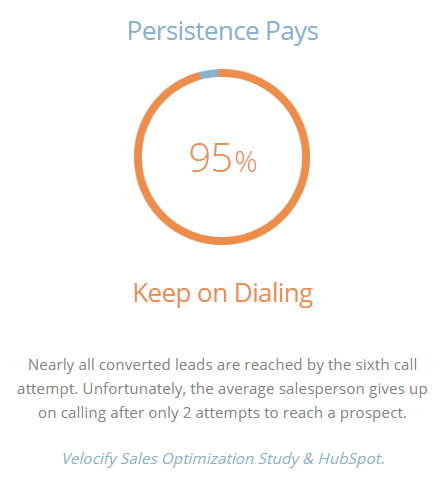Cold Calling is like Kissing
Growth Orbit Insights
Cold Calling is like Kissing: If you are not getting the results you want, you are probably doing it wrong.
by Paul Fine
Nobody Likes Cold Calling
Cold calling is roundly maligned as “old school”, “out of date” and “ineffective”. Here’s why:
- Salespeople generally don’t like doing it because the sales cycle tends to be longer because you are starting closer to the beginning of the selling process (I don’t need to see the birth, just give me the baby).
- Marketing people think that inbound campaigns can replace outbound cold calling by developing scoring algorithms in an automated platform, “instantly” identifying marketing qualified leads (MQLs) that will be accepted by Sales as qualified opportunities for a sale (SQLs).
- Marketing automation vendors want to convince you that robo-calling 150 prospects (and I use that term loosely) per day will somehow generate 3X the number of SQLs as having a trained Sales Development Representative (SDR) making 50 dials/day.
Why Don't Salespeople Like Cold Calling?
Salespeople don’t like to prospect, they want to sell. Most businesspeople have heard the theory that salespeople are divided into 2 groups: Farmers and Hunters. Farmers want to harvest a mature field of customers (upsell, cross-sell, renew contracts, account management, etc.). Hunters want to hunt for the new customer. But even Hunters prefer to have a Guide with them to identify the most likely prospects, know what their buying habits are and when they are most likely to be receptive to a salesperson’s pitch. This prospect identification is best done by a trained SDR, not a salesperson who will get discouraged by the 5th dial/ no response of the day.
Why Don't Marketing People Like Cold Calling?
Marketing people tend to believe any contact with a prospect is a MQL. Marketing people (of which I admit I am one) tend to believe that you can quantify any scenario to get to a successful outcome. Inbound requests for info from the web site, mass emails to purchased lists that can be identified when “opened”, business cards tossed into a fishbowl at a Trade Show (pre-COVID 19), etc. are all traditional ways to gather names for Sales to pursue. Assigning values to those different sources of “prospects” can give you a false sense of accuracy as to whether that is a legitimate MQL, let alone a likely SQL.
You need an intermediary to further qualify that contact before sending a salesperson off to chase a ghost. Growth Orbit has done many campaigns qualifying a client’s inbound “leads” to discover they are tire-kickers (only 5-15% of inbound contacts are actually qualified), have personal interest unrelated to their company responsibilities (and decision-making authority) or are doing early research for a subsequent fiscal year. Our SDRs can separate the wheat from the chaff and put legitimate prospects into a Nurture cycle so we can transfer them to the Client at the appropriate time in the Buying Cycle.
Why Don't Marketing Automation Vendors Like Cold Calling?
 Marketing Automation Vendors come in many shapes and sizes (e.g. auto-dialers, predictive dialing, Assisted Dialing Services, etc.). Many believe AI is superior to human review. I get pitched on a regular basis for how an automated calling software will reach 3X as many “prospects” as a human dialer, resulting in 3X as many connections, and 3X as many MQLs/SQLs. I have not yet seen any studies that bear this out. The slope of that curve is not a straight line. Just think of all the spam mail and spam calls you get now, and how often you ask yourself “how did I get on this person’s call list?”
Marketing Automation Vendors come in many shapes and sizes (e.g. auto-dialers, predictive dialing, Assisted Dialing Services, etc.). Many believe AI is superior to human review. I get pitched on a regular basis for how an automated calling software will reach 3X as many “prospects” as a human dialer, resulting in 3X as many connections, and 3X as many MQLs/SQLs. I have not yet seen any studies that bear this out. The slope of that curve is not a straight line. Just think of all the spam mail and spam calls you get now, and how often you ask yourself “how did I get on this person’s call list?”
And, what happens to all the connections that are made for which an SDR is not available to take the call? Conversely, how prepared can the SDR be to handle a call for which they have no background information? What about the missed opportunities to gather intelligence and insights from the receptionist, executive assistant and other gatekeepers. At what stage of that outreach process can the SDR find time to research and tailor their message for the intended target? These services may propose to reduce the work, but trading quality for quantity is not always the best course of action.
Who Likes Cold Calling? Those Who Do it Correctly.
Successful cold calling starts with an understanding of your Total Addressable Market (TAM), identifying the decision-makers and decision-influencers for your product/service and understanding their likely need for your solution (I did Lead Gen for SOX Compliance software a few years after that law was passed in 2002; it was like shooting fish in a barrel). Calling every Fortune 5000 CFO to sell your Financial Services software is probably not going to be very efficient or effective. Achieving more “connects” with the wrong people at the wrong time is going to generate fewer SQLs than a focused approach against the right target at the right time. Research studies show it takes on average between 6 and 8 cold call attempts to reach a prospect. Unfortunately, the average salesperson gives up on calling after only 2 attempts.
In addition, a trained SDR will know how to add context to their message and personalize the one-on-one introduction to set themselves apart from all the other salespeople calling that person that day (what, you thought you were the only one?). For example, if the SDR has learned the person is relatively new to that company/position (check LinkedIn or other sources), you don’t ask them to “tell me about the current environment, processes and tools you have,” you ask them to tell you about the environment, processes and tools they INHERITED. This immediately tells them you know something about them (they are new) and relieves them from taking a defensive posture because you told them you know they “inherited” whatever isn’t working so it isn’t their fault. You would be surprised how that subtle change can open-up a conversation.
In summary, when done correctly, cold calling can be very effective. If you don’t like it, keep in mind the need to:
- call the right people
- call at the right time
- in the right context
- have a trained professional do it
If you are a senior Marketing person who would like to benchmark an outbound calling program against your current approach or a senior Sales Leader whose team is getting frustrated with the so-called MQLs they are getting that turn out to not have any future revenue opportunity, then contact Growth Orbit and learn how we have generated over $150M in SQL pipeline for our clients since the start of the pandemic. Successful cold calling is not a game for amateurs; contact Growth Orbit to learn how the professionals do this.
About the Author
Paul Fine was a seasoned marketing and business development professional before joining Growth Orbit, well-versed in leading all phases of marketing programs – from conception to completion. Paul has significant CPG experience with companies such as P&G, GSK, Pillsbury, and Nestle. Paul has a BS in Marketing from University of Illinois-Chicago and an MBA from Northwestern University Kellogg School of Management.





